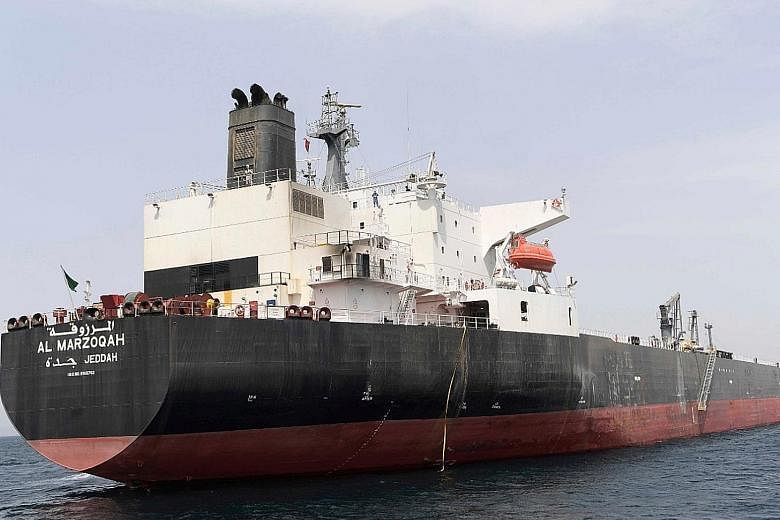TOKYO • Iran's Foreign Minister said yesterday there is "no possibility" of negotiations with the United States to reduce spiralling tensions between the two countries.
"No, there is no possibility for negotiations," Japan's Kyodo news agency cited Mr Mohammad Javad Zarif as saying. The minister is in Tokyo to meet Japanese officials.
Kyodo said Mr Zarif was replying to a question on whether he would be open to bilateral talks with Washington aimed at easing tensions in the Middle East that have fuelled concern that the US and Iran are heading for conflict.
The Kyodo report did not immediately carry additional comments from Mr Zarif, but public broadcaster NHK quoted the minister as describing US pressure on Iran as an "act of suicide".
The US on Wednesday withdrew staff from its embassy in Iraq, out of apparent concern about threats from Iran, with US sources saying they believe Iran encouraged recent attacks on oil tankers.
An attack on four oil tankers in the Gulf on Sunday, for which no one has claimed responsibility, and Saudi Arabia's announcement on Tuesday that armed drones had hit two of its oil pumping stations have compounded worries about war.
A US government source on Wednesday said American security experts believe Iran gave its "blessing" to the attacks on two Saudi oil tankers, a UAE-flagged fuel bunker barge and a Norwegian-registered oil products tanker off Fujeirah near the Strait of Hormuz.
The source said the US believes Iran's role was one of actively encouraging militants, but indicated it does not have evidence that Iranian personnel played any direct operational role in the attacks.
US Secretary of State Mike Pompeo made a surprise visit to Baghdad last week after US intelligence showed Iran-backed Shi'ite militias positioning rockets near bases housing American forces, according to two Iraqi security sources.
British Foreign Secretary Jeremy Hunt yesterday said he shared the same assessment as the US of the heightened threat posed by Iran. His statement came as the UK raised the threat level for its armed forces and diplomats in Iraq, citing an increased security risk from Iran, according to two people familiar with the matter.
Mr Zarif yesterday said Iran is committed to its obligations under an international nuclear deal despite the US withdrawal from the landmark agreement. He also called the reimposition of US sanctions "unacceptable".
Iran is exercising "maximum restraint in spite of the fact the United States withdrew from (the) JCPOA last May", Mr Zarif said at the start of his meeting with Japanese Foreign Minister Taro Kono. He was referring to the Joint Comprehensive Plan of Action signed in 2015 by the US, Iran and other countries, under which Teheran curbed its uranium enrichment capacity and won sanctions relief in return.
"We believe that escalation by the United States is unacceptable and uncalled for," Mr Zarif told Mr Kono in front of reporters, before they met privately.
"I'm concerned that the situation in the Middle East is becoming very tense," Prime Minister Shinzo Abe told Mr Zarif in a later meeting.
Mr Kono said it was essential to maintain the nuclear agreement and urged Iran to keep implementing it, echoing other countries.
President Donald Trump withdrew the US from the agreement last year and is ratcheting up sanctions on Iran, aiming to strangle its economy by ending its international sales of crude oil. Japan was a major buyer of Iranian oil for decades before the sanctions.
Mr Trump is sending an aircraft carrier group, B-52 bombers and Patriot missiles to the Middle East to counter what the US calls a heightened threat from Iran to American soldiers and interests in the region.
Helicopters took off throughout Wednesday from the US embassy compound near the Tigris River in Baghdad, carrying non-emergency employees out, said an Iraqi source and a diplomatic source inside Baghdad's fortified Green Zone.
Iran has described the US moves as "psychological warfare", while its Foreign Ministry said the tanker attacks were "worrisome and dreadful", and called for an investigation.
Nevertheless, Iran has relaxed restrictions on its nuclear programme and threatened action that could breach the nuclear deal, although the initial moves do not appear to violate the agreement.
REUTERS, AGENCE FRANCE-PRESSE, BLOOMBERG

